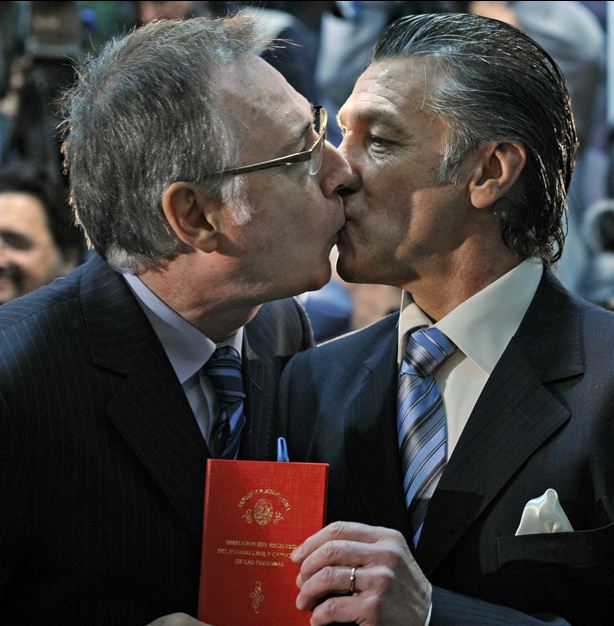|
'Marriage', 'Weddings' and churches
A joint statement has been issued by five evangelical organisations on the subject of homosexual marriage and the registration of civil partnerships in churches
Joint Statement by Affinity, The Christian Institute, Christian Concern, Reform and the Fellowship of Independent Evangelical Churches
 THERE has been speculation in the press about the Government's proposals for civil partnerships to be registered in places of worship. There has also been speculation, and indeed confusion, over the separate issue of scrapping the definition of marriage in order to allow two people of the same sex to hold a marriage certificate. THERE has been speculation in the press about the Government's proposals for civil partnerships to be registered in places of worship. There has also been speculation, and indeed confusion, over the separate issue of scrapping the definition of marriage in order to allow two people of the same sex to hold a marriage certificate.
Government proposals to allow civil partnerships in churches implement changes made in the 2010 Equality Act. However, there has been no announcement from the Government that it has any plans to introduce full same-sex marriage.
The definition of marriage
The thousands of churches that our organizations represent hold firmly to the clear teaching of the Bible that marriage is the lifelong, exclusive union of one man and one woman. This is the definition that has long been recognized in English law and, indeed, by almost all cultures for all of human history.
Marriage was ordained by God for the good of all people and is a holy institution. It was also designed to represent something of the relationship between Christ and his church. There are two partners to a marriage because there are two sexes. Marriage is a complementary covenant involving the bringing together of the two sexes not only for the purposes of procreation but also to reflect more fully the image of God.
We are also concerned about the effect of declaring that the institution in which children are raised does not require both a mother and a father.
For all these reasons we, and many others, would firmly oppose any efforts to eradicate the definition of marriage and impose a new definition on everyone in order to satisfy the demands of gay rights groups.
Civil partnerships in churches
We reiterate our long-held opposition to allowing civil partnerships to be registered in churches. It is a breach of undertakings made by Government ministers during debates on the Civil Partnership Bill. Parliament was persuaded to pass that Bill, in part, because it was made clear that civil partnership was a civil rather than a religious institution and would not take place in religious premises.
However, there are a small number of religious groups who are not content with being able to carry out civil partnership blessing ceremonies, as they currently do, but who want the legal registration itself to take place in their premises. In response to the demands of these groups, the Government is embarking on a course of action that is bringing it into conflict with thousands of evangelical churches and the Church of England and the Roman Catholic Church.
In any legislation, churches must be protected against the possibility, now and in the future, of any kind of legal action being brought against churches which conscientiously disagree with civil partnerships.
When it comes to equality legislation, permission often turns rapidly into coercion. In a country where faith-based adoption agencies have been forced to close or cut their religious ties by equality law, where Christian marriage registrars can be dismissed for their religious views on marriage and where Christian B & B owners are forced to pay compensation to same-sex couples, Christians will need a great deal of reassurance that the Government is not about to do something that will make their situation even worse.
Issued on behalf of:
Affinity
The Christian Institute
Christian Concern
Reform
The Fellowship of Independent Evangelical Churches
----------
From the BBC...
Prominent homosexual Peter Tatchell said: "Mr Tatchell said: "Permitting faith organisations to make their own decision on whether to conduct same-sex civil partnerships is the democratic and decent thing to do.
"The current law prevents them from doing so, even if they want to. No religious institution will be forced to perform civil partnerships if they do not wish to do so."
The Archbishop of York, Dr John Sentamu, gave the news a guarded welcome.
He told the BBC's Andrew Marr Show he "believes in a liberal democracy, and actually wants equality with everybody" but did not want churches to be told what to do.
"You mustn't have rights that trump other rights," he added. Read on at the BBC.....
Affinity describes itself as "a growing network of many hundreds of Bible-centred churches and Christian agencies throughout Britain and Ireland". It was formerly known as the British Evangelical Council.
The Christian Institute is a nondenominational Christian charity committed to upholding the truths of the Bible.
Reform was established in 1993 as a network of individuals and churches promoting the gospel of Jesus Christ by reforming the Church of England
Christian Concern (previously Christian Concern for our Nation) grew out of the Lawyers Christian Fellowship. Christian Concern describes itself thus: "We are a Christian organisation that seeks to put the hope of Christ at the heart of our nation.
The Fellowship of Independnt Evanglical Churches (FIEC) describes its role as "all about equipping churches that are shaped by the Bible and driven by the gospel to become a powerful movement of God’s people that, in his hands, can help to change the nation.FIEC is the largest constituent member of Affinity
Footnote: There are differences between Scotland and England/Wales relating to marriage in churches. In Scotland it is the person performing the ceremony who is registered; in England/Wales the (church) building is registered as a premise.
|
Christians Together, 16/02/2011
|
|
|
|